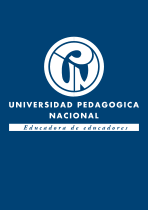Acción colectiva de las redes magisteriales que hacen comunagogía.

Citación
Fecha
2020-12-21Autor
Jaime Fajardo, Juan Carlos
Enlace al recurso
https://revistas.pedagogica.edu.co/index.php/NYN/article/view/8452Metadatos
Mostrar el registro completo del ítemResumen
Este artículo de investigación expone cómo la acción colectiva de las redes de maestros, que se llaman a sí mismas como alternativas, se está configurando en Bogotá, y cómo a través de sus prácticas educativas alternativas han transformado la escuela, la educación, los maestros y el territorio. Según las referencias teóricas, esta acción no se limita a reaccionar contra la política educativa oficial, por lo que trasciende el marco de interpretación de los movimientos sociales. Esto permite concluir que estas redes generan propuestas instituyentes en sus contextos, que se caracterizan como sentipensantes, tácticas, proactivas, permanentes y dispersas, por lo tanto es posible llamarla acción colectiva latente. Para esta investigación se estudiaron tres redes magisteriales de Bogotá aplicando el enfoque sociocrítico, cuya estrategia metodológica fue la narrativa, y se conformaron tres grupos de discusión. También se realizaron trece entrevistas semiestructuradas y se leyeron los documentos internos producidos por cada red.
Abstract
This research article exposes how the collective action of the teaching networks that call themselves as alternative is getting setup, in Bogota, and also how, through their alternative teaching practices, they have transformed the school, the education, the teachers and the territory. According to the theoretical references, this collective action is not limited to react against official education policy, and so it transcends the frame of interpretation of social movements. This permits to conclude that these networks generate instituting proposals in their contexts, by means of their collective action, which is characterized as sentipensante, tactical, proactive, permanent and disperse. Thus it is possible to call it as latent collective action. For this research three teaching networks from Bogota were studied applying the socio critical approach. The methodological strategy was the narrative, and three discussion groups were conformed. Thirteen semistructured interviews were also done and the internal documents produced by each network were read too.
Editorial
Editorial Universidad Pedagógica Nacional
Fuente
Colecciones
- Nodos y Nudos [527]
